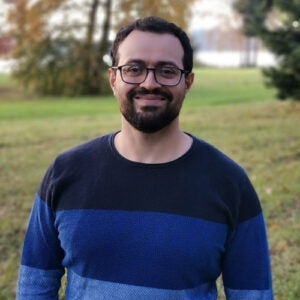
Ahmad Jomaa, PhD
Ahmad Jomaa, PhD, an assistant professor in the Department of Molecular Physiology and Biological Physics, and his lab were recently awarded a five-year, $2.22 million NIH Maximizing Investigators’ Research Award (R35) for the project titled “Unraveling the Mechanisms of Protein Sorting and Localization to Organelles.” This research focuses on how newly made proteins are properly delivered to and processed on cellular membranes, an essential process for maintaining cellular health and preventing harmful protein buildup inside cells. Disruptions in these pathways have been linked to diseases such as Alzheimer’s, Parkinson’s, and, more recently, a rare neurodegenerative disorder called Congenital Disorders of Glycosylation. Over the next five years, Dr. Jomaa’s team will use advanced techniques, including cryo-electron microscopy and cellular imaging, to capture high-resolution snapshots of how proteins interact with molecular machines on mitochondria and the endoplasmic reticulum. By understanding these interactions at molecular detail, the lab hopes to uncover new strategies to prevent protein misfolding, which is a key contributor to many neurodegenerative and developmental disorders.
In a second project, Dr. Jomaa’s lab received a three-year, $741,500 award from the U.S. National Science Foundation (NSF) for the collaborative project “Investigating Ribosome Tethering to Mitochondria in Dormant Yeast Cells.” Researchers will explore how cells survive environmental stress by entering a dormant, energy-saving state. In collaboration with the group of Dr. Simone Mattei at EMBL, Germany, the Jomaa lab recently discovered a novel adaptive response in dormant yeast cells, where ribosomes, the cellular machines that make proteins, attach to and hibernate on the surface of mitochondria. This surprising strategy may be conserved across many forms of life. The project is funded jointly by the NSF and the German Research Foundation (DFG), with the DFG providing independent funding for the international collaboration and Dr. Mattei’s research activities. Over the next three years, the researchers will combine structural biology, yeast genetics, and biochemistry to uncover how this ribosome tethering supports cell survival and how protein production restarts once conditions improve. The grant also supports an outreach initiative that brings 3D-printed molecular models and hands-on interactive activities in structural biology to local middle and high schools in Charlottesville and Albemarle County.
Filed Under: Research
